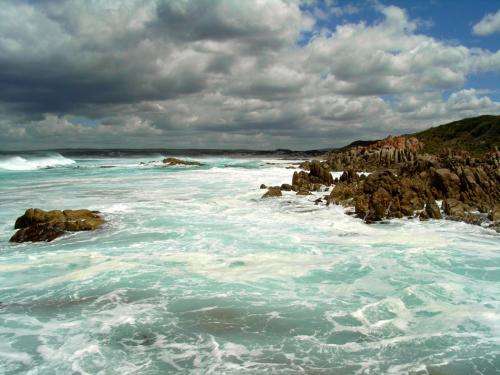Study finds climate change is causing modifications to marine life behavior

Oceans cover 71 percent of the Earth's surface, yet our knowledge of the impact of climate change on marine habitats is a mere drop in the proverbial ocean compared to terrestrial systems. An international team of scientists set out to change that by conducting a global meta-analysis of climate change impacts on marine systems.
Counter to previous thinking, marine species are shifting their geographic distribution toward the poles and doing so much faster than their land-based counterparts. The findings were published in Nature Climate Change.
The three-year study, conducted by a working group of UC Santa Barbara's National Center for Ecological Analysis and Synthesis (NCEAS) and funded by the National Science Foundation, shows that warming oceans are causing marine species to change breeding, feeding, and migration timing as well as shift where they live. Widespread systemic shifts in measures such as distribution of species and phenology—the timing of nature's calendar—are on a scale comparable to or greater than those observed on land.
"The leading edge or front-line of marine species distributions is moving toward the poles at an average of 72 kilometers (about 45 miles) per decade—considerably faster than terrestrial species, which are moving poleward at an average of 6 kilometers (about 4 miles) per decade," said lead author Elvira Poloczanska, a research scientist with Australia's national science agency, the Commonwealth Scientific and Industrial Research Organisation (CSIRO), Marine and Atmospheric Research in Brisbane. "And this is occurring even though sea surface temperatures are warming three times slower than land temperatures."
The report, which involved scientists from 17 institutions, including NCEAS associates Carrie Kappel and Ben Halpern and former NCEAS postdoctoral associates Mary O'Connor, Lauren Buckley, and Camille Parmesan, forms part of the Fifth Assessment Report of the United Nations Intergovernmental Panel for Climate Change (IPCC). The Geneva-based IPCC assesses scientific, technical, and socioeconomic information concerning climate change, its potential effects, and options for adaptation and mitigation.
"The effects of climate change on marine species have not been a major focus of past IPCC reports because no one had done the work to pull together all the disparate observations from around the world," said Kappel. "This study provides a solid basis for including marine impacts in the latest global accounting of how climate change is affecting our world."
Unlike previous climate change assessments, which relied heavily on terrestrial data to estimate marine impacts, the NCEAS working group scientists gathered from seven countries to assemble a large marine-only database of 1,735 changes in marine life from the global peer-reviewed literature. The biological changes were documented from time series, with an average length of 40 years of observation.
"Here's a totally different system with its own unique set of complexities and subtleties," said Camille Parmesan, professor in the Department of Integrative Biology at University of Texas at Austin. "Yet the overall impacts of recent climate change remain the same: an overwhelming response of species shifting where and when they live in an attempt to track a shifting climate.
"This is the first comprehensive documentation of what is happening in our marine systems in relation to climate change," added Parmesan. "What it reveals is that the changes occurring on land are being matched by the oceans. And far from being a buffer and displaying more minor changes, what we're seeing is a far stronger response from the oceans." Parmesan has been active in IPCC since 1997, and in her capacity as a lead author, she shared in the award of the 2007 Nobel Peace Prize to IPCC.
The research revealed telltale traces that collectively build the case for climate change causing modifications in the ocean. These fingerprints of climate change include movements of species toward the poles as ocean temperatures rise, with an average displacement up to ten times that for terrestrial species. Phytoplankton, zooplankton, and bony fish showed the largest shifts.
Researchers also found that the timing of spring events in the oceans had advanced by more than four days, nearly twice the figure for land. The strength of response varied among species, but again, the research showed the greatest response—up to 11 days in advancement—occurred in invertebrate zooplankton and larval bony fish.
Multiple lines of evidence supported the hypothesis that climate change is the primary driver behind the observed changes: for example, opposing responses in warm-water and cold-water species within a community and similar responses from discrete populations at the same range edge. In total, 81 percent of all observations, whether for distribution, phenology, community composition, abundance, or demography, across different populations and ocean basins were consistent with the expected impacts of climate change.
More information: Global imprint of climate change on marine life, DOI: 10.1038/nclimate1958
Journal information: Nature Climate Change
Provided by University of California - Santa Barbara


















